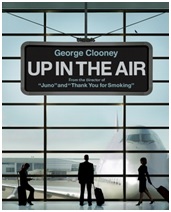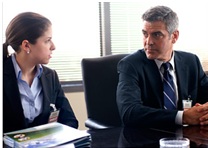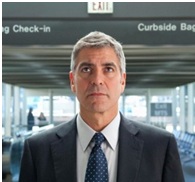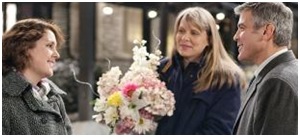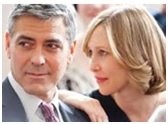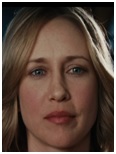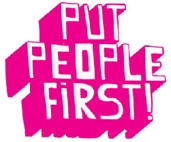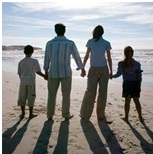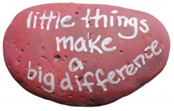|
 |
|
 |
|
|
||
Up in the Air - Success and Business Ethics
Up in the Air (2009)
Famous for...
Based on... Walter Kirn’s (pictured right) novel, Up in the Air.
Director Jason Reitman (pictured right).
Oscars None (but received six nominations).
Key characters Ryan Bingham (George Clooney), a fortysomething corporate downsizer (hired by different companies to fire people). Alex Goran (Vera Farmiga), his girlfriend and fellow travelling executive, also in her
40’s. Natalie Keener (Anna Kendrick), his 23-year-old colleague (pictured right with Bingham). Craig Gregory (Jason Bateman), his boss. Kara Bingham (Amy Morton), his older sister. Julie Bingham (Melanie Lynskey), his younger sister. Jim Miller (Danny McBride), Julie’s fiancé.
The story Fortysomething Ryan Bingham (pictured right):
His ambition is to be only the seventh person to accumulate 10 million air miles. In his interviews the fired employees are obviously devastated (and often very angry and concerned for their families), but he:
He also:
His contentment is shattered by:
Ryan's boss (Craig Gregory):
Natalie:
Ryan and Alex (pictured right below) try to console Natalie, who is shocked when an African American interviewee, Karen Barnes, says she will kill herself on hearing about her dismissal. They try the videoconferencing but this leaves no one to comfort a fired employee who breaks
down in tears. Ryan asks Alex to go away for the weekend (pictured right) for his sister Julie’s marriage to Jim. He is disappointed when Julie wants Jim’s uncle, not him, to take her down the aisle. But he persuades a wavering Jim to carry on with the marriage by:
Ryan discovers that a lot of other people have been taking photos of Julie and Jim’s cut-out as a substitute for a honeymoon they can’t afford. Soon after the wedding, he walks out at the beginning of his ‘What’s In Your Backpack?’ speech, because he
doesn’t believe it anymore. He goes to Alex’s (pictured right) Chicago home, hoping for a more permanent relationship. But he leaves broken-hearted after discovering that she’s married with children. The next day she:
On his flight home it is announced that he has passed 10 million air miles and the captain tells him he is the youngest person to have done this. When he arrives back at his office, he transfers a million air miles to Julie and Jim so that they can fly around the world for a honeymoon. His boss, Ryan Gregory tells him that the videoconferencing has been dropped, and the old person to person interviewing will continue. On hearing that Karen Barnes really did commit suicide, Natalie (telling Gregory by text) joins a San Francisco company, helped by Ryan’s glowing letter of recommendation. The film ends with Ryan staring at a huge airport destination board, begging the question: Will he carry on his city hopping interviewing, or leave for a more fulfilling people centred life elsewhere?
Lessons for success and business ethics
1. People need people Ryan loves his life “up in the air”. But, through his friendship with Alex and Natalie, he:
But he is devastated when the deceitful (and married) Alex tells him he is only an “escape” and a “parenthesis”.
2. People comes before profit Karen Barnes’ suicide shows how Ryan and Natalie’s interviews:
Natalie leaves because she realizes that people must always come first, a philosophy initially rejected by Ryan. In his ‘What’s In Your Backpack’ speech Ryan says we are all sharks in a fast moving war for success that is won by discarding from your backpack the weight of your relationships. But his relationships make him realize that people are more important than his job (which is why he gives his air miles to Julie and Jim so that they can have a great honeymoon). He is also kind enough to write a job winning letter of recommendation for Natalie.
3. Deal with people face to face Electronic communication is heartless because it lacks the empathy of face to face contact. Natalie:
Videoconferencing makes the firing interviews even more emotionally devastating, as opposed to Ryan who:
He persuades one man to use his redundancy money to pursue his love of cooking. 4. Don’t forget your family Alex has something incredibly valuable that Ryan lacks – a real home with a family she loves (despite her duplicitous affair with Ryan).
5. Cutting costs can hurt customers Videoconferencing is cheaper but worse for the person being fired, because human empathy and understanding are removed from the interview. 6. Little things mean a lot Ryan’s photos of Julie and Jim’s cardboard cut-out help them to bear the disappointment of not having a honeymoon. Then the generous gift of Ryan’s air miles gives them a fantastic one after all!
Key quotes on relationships Make no mistake your relationships are the heaviest components in your life, Ryan Bingham (in his ‘What’s In Your Backpack?’ speech). Life’s better with company...Everybody needs a co-pilot, Ryan (to Jim, Julie’s fiancé). Make no mistake, we all die alone, Ryan (to Natalie).
Key quotes on success The slower we move, the faster we die . . . we're sharks, we have to keep moving, Ryan (in the backpack speech)
Key quotes on downsizing Anyone who ever built an empire or changed the world sat where you’re sitting right now, Ryan (his opening line to the people he fires).
Key quote on family My kids are my purpose, someone who Ryan fires.
Key quote on work and family Tonight, most people will be welcomed home by jumping dogs and squealing kids. Their spouses will ask about their day, and tonight they’ll sleep. The stars will wheel forth from their daytime hiding places and one of those lights, slightly brighter than the rest, will be my wingtip passing over, Ryan’s voiceover at the end of the film staring at the airport destination board.
Two film websites to recommend 1. filmsite.org (run by Tim Dirks). 2. aveleyman.com (run by Tony Sullivan) |
|
|
||
|
|
||
| Copyright © wisdomtowin.com 2025 All Rights Reserved | ||
|


